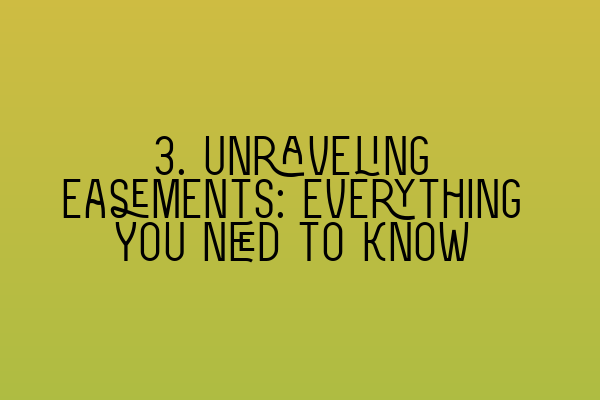Unraveling Easements: Everything You Need to Know
Welcome to another informative blog post from SQE Property Law & Land Law. Today, we will be discussing one of the fundamental aspects of property law – easements. Easements are an important concept to understand as they can have a significant impact on property rights and ownership. Whether you are a property owner, buyer, or solicitor, this article will provide you with a comprehensive understanding of easements and their implications.
What is an Easement?
An easement is a legal right that provides a person or entity with limited use or access to another person’s property. It allows for the use of someone else’s land for a specific purpose, even though they do not have ownership of the land. The most common types of easements include rights of way, rights to light, and rights to drainage. These easements can be created by express agreement, implication, or by necessity.
Explain Easement types:
- Rights of Way: A right of way easement allows a person or entity to pass through another person’s property to access a specific location. This could be a footpath, driveway, or road that benefits the dominant land.
- Rights to Light: A right to light easement allows a property to receive a specific amount of natural light through windows or other openings. This ensures that neighboring developments do not obstruct the light source.
- Rights to Drainage: A right to drainage easement allows for the flow of water through one property to another. This is particularly important in hilly or low-lying areas where drainage routes need to be established.
Now that we understand the basics of easements, let’s delve into the essential elements required for an easement to be valid:
Elements for a Valid Easement
A valid easement requires the following elements:
- Grantor and Grantee: There must be a grantor (the person granting the easement) and a grantee (the person or entity receiving the easement).
- Dominant and Servient Land: There must be two distinct parcels of land involved – the dominant land (the land that benefits from the easement) and the servient land (the land over which the easement is granted).
- Intention: There must be a clear intention to create an easement. This can be achieved through written agreements or by implication.
- Legal Formalities: Depending on the jurisdiction, there may be legal formalities that need to be followed to create a valid easement. These requirements usually include written agreements, registration, or deeds.
It’s crucial to ensure that all these elements are satisfied to establish a legally binding easement. Failing to meet any of these requirements may result in the easement being deemed invalid and unenforceable.
Implications of Easements
Easements have several important implications for property owners and buyers:
- Property Rights: Easements grant specific rights to the beneficiary, often limiting the full enjoyment of the servient land by the owner. It’s essential for property owners and buyers to be aware of any existing easements on the property they are dealing with.
- Property Value: Easements can impact property value, especially if they restrict certain uses or access to the property. It is crucial to consider the impact of existing easements when assessing the value of a property.
- Enforcement and Disputes: Disputes can arise regarding the scope or extent of easements. It is advisable to seek legal assistance to enforce or resolve any easement-related conflicts.
If you are currently involved in a property transaction or require legal advice regarding easements, it is crucial to consult an experienced property solicitor. At SQE Property Law & Land Law, our team of expert solicitors can guide you through the complexities of easements and ensure that your rights are protected.
For further information or assistance on property law, we recommend checking out our related articles:
SQE 1 Practice Exam Questions
SQE 1 Practice Mocks FLK1 FLK2
SQE 2 Preparation Courses
SQE 1 Preparation Courses
SRA SQE Exam Dates
We hope you found this article informative and insightful. If you have any further questions or inquiries, please do not hesitate to contact SQE Property Law & Land Law. Our expert solicitors are here to assist you in all your property law needs.
